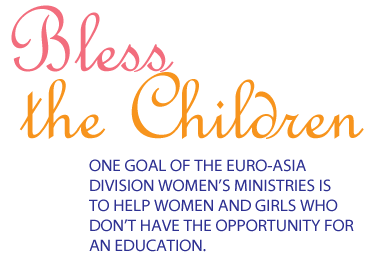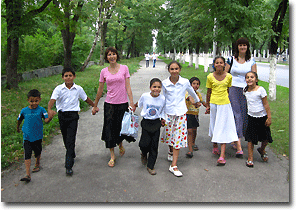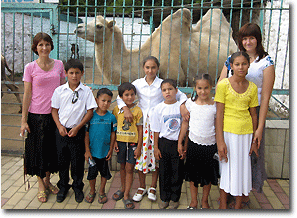
Illiteracy is related to low social status, poverty, and poor health. ESD WM asked themselves, Are there such problems in Russia? And how can we help? Church members faced such a matter in Nalchik city, Kabardino-Balkaria. About 12 refugee Gypsy children from Georgia started to visit church. These boys and girls, from 7 to 15 years old, were attracted by having lunch on Sabbath after worship. But they were noisy and disobedient during the worship, and there were also several thefts.
 Church members started thinking of how to help them. The church gave the children an ultimatum: they were to be silent in the church or they could not attend, and the church would not look for the thieves. The thefts stopped, and the children were seated all over the church with members who watched over them. Since the children could not read or write, a new Sabbath school class was started for them. Tamara, one of the sisters, agreed to teach the children during the week to read and write. She even prepared white ironed shirts, pants, and skirts for the children to wear for the Sabbath services. Every Sabbath Tamara changes their clothes and fixes their hair.
Church members started thinking of how to help them. The church gave the children an ultimatum: they were to be silent in the church or they could not attend, and the church would not look for the thieves. The thefts stopped, and the children were seated all over the church with members who watched over them. Since the children could not read or write, a new Sabbath school class was started for them. Tamara, one of the sisters, agreed to teach the children during the week to read and write. She even prepared white ironed shirts, pants, and skirts for the children to wear for the Sabbath services. Every Sabbath Tamara changes their clothes and fixes their hair.
 These children’s parents don’t visit the church but don’t forbid the children. And one Gypsy family, despite financial problems, bought Sabbath clothes for their children. Now these children take part in the service; they read poetry and sing songs about Christ. Tamara doesn’t have her own children, but she puts all her love and care into these children. When church members call her “Gypsy Mother,” she is not offended. She says that the Lord doesn’t let her be alone. And most important is that the children love her.
These children’s parents don’t visit the church but don’t forbid the children. And one Gypsy family, despite financial problems, bought Sabbath clothes for their children. Now these children take part in the service; they read poetry and sing songs about Christ. Tamara doesn’t have her own children, but she puts all her love and care into these children. When church members call her “Gypsy Mother,” she is not offended. She says that the Lord doesn’t let her be alone. And most important is that the children love her.


